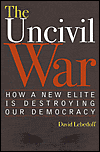Uncivil War

The Uncivil War is not a book I would have typically purchased for myself. It was sent to me along with an invitation to a discussion group. Humorously enough it was sent by a law firm while Lebedoff goes on at some length about how lawyers are one of the specific groups that typically make up his unimaginatively titled “New Elite”. I’ve been particularly interested in the presidential campaign this year and this book showed up at the right time so I decided to give it a read.
Lebedoff’s text describes a “New Elite” that he believes are fundamentally against majority rule, which he ascribes as one of the most important functions of the American democracy. He believes that this New Elite is in the process of trying to take America away from Americans. While Lebedoff proclaims the book to be non-partisan it is somewhat hard to believe as he spends the first 170 pages of the book showing how Democrat = Liberal = New Elite and how the Republican = Conservative = The Left Behinds. The Left Behinds are his name for those that believe that the majority is right.
It’s hard to swallow his naming and categorization of people in these bins. Perhaps any text that tries to take such a simple approach to the American public is bound to have these type of problems. Perhaps it’s also my own personal beliefs that conflict with Lebedoff’s and make his theories seem so conspiracy theorist and convoluted. Of course the author could simply write me off by saying that I were one of the New Elite. As any prejudiced label is bound to do, it makes the argument simple by writing off the opposing opinion. Something that he proclaims the New Elite does all the time.
It took 180 pages and nearly the entire book for Lebedoff to make any reference to a republican agenda or elected official as a member of the new elite. He picks Newt Gingrich and even when he does he pardons Gingrich with temporarily using New Elite tactics. Please…
I do believe there is a “New Elite” but it’s not limited to liberals and educated people. There clearly is a desire to minimize the majority electoral practice in favor of the game of politics. And both parties are equally guilty of this.
As a final note, I found it somewhat revealing that while the author goes on and on about majority rule and how important it is he makes no reference to the fact that Gore won the popular vote in 2000 and lost the election. As Lebedoff even uses this election as an example of the success of the Left Behinds, I find it surprising that there was no reference to an action that flies clearly in the face of what Lebedoff suggests is so critical to the future of America.